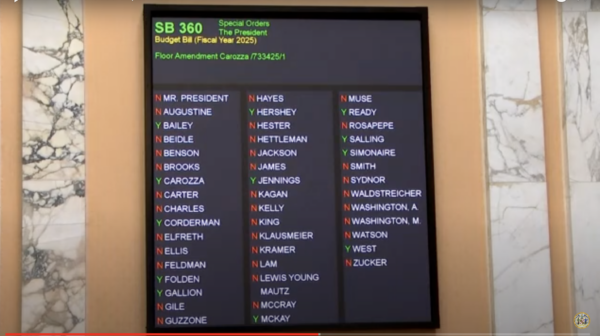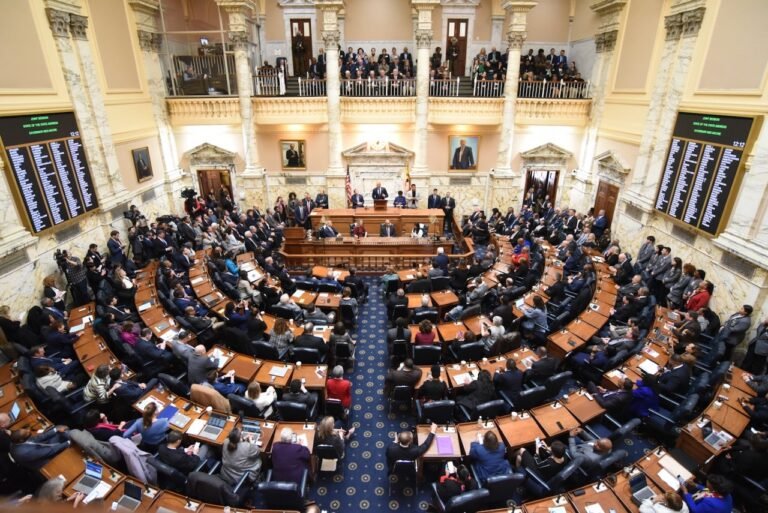Wednesday’s House committee vote begins a new battle with Senate finance leaders over new spending this year.
The House Ways and Means Committee voted 15-7 to approve House Bill 1319, which could open the door to casino-style iGaming in Maryland. The committee’s vote was mostly along party lines, with Rep. Joe Vogel (D-Montgomery) joining six Republicans in opposition.
The vote comes despite Senate leaders saying they oppose both gaming expansion and taxes this Congress, including the gaming bill’s sponsor, Chairman Vanessa E. Atterbeary (D-Howard). The move was also made in response to efforts being made to improve tax policy.
“I think it’s a different story when things are in front of you and actually on the table and it passes,” Atterbeary said. “We have made it clear that our members are interested in doing something for the blueprint and transportation this session and are interested in getting any kind of hard vote in this session rather than the next session. We are going to send what we think is right.”
The iGaming bill, which has not yet been introduced in the Senate, would create a licensing system that includes ensuring that minority- and women-owned businesses have a stake in the growing industry. Additionally, the bill would allocate revenue primarily to benefit the education reform package known as the Blueprint for Maryland’s Future.
This bill would amend a provision in the Maryland Constitution that deals with gaming, including slot machines and casinos.
If the bill passes both houses of Congress and is signed into law by the governor, it would need approval by a majority of voters in the November general election.
The committee vote Wednesday night sends the bill to the full chamber. The timing all but guarantees the bill will reach the Senate by the key deadline.
“Crossover Day” is a deadline that guarantees that bills passed in one chamber will be considered in the weeks leading up to the end of the session at midnight on April 8th.
Meeting loose deadlines is only part of the battle.
Submitting a bill to the opposite chamber does not guarantee that it will be processed favorably or even at all.
For weeks, Senate leaders, including Senate President Bill Ferguson (D-Baltimore) and Senate Budget and Taxation Chairman Guy Gatzon (D-Howard), have announced that their chambers have casinos accessible by computer, phone, and Internet. He has said he is not ready to introduce the style game in the state. and other devices.
On Wednesday, hours before a House committee vote, Guzzone reaffirmed his stance against iGaming.
Last month, the Senate held hearings on two iGaming-related bills proposed by Sen. Ron Watson (D-Prince George’s). Another idea is to bring the issue to voters for approval in November, allowing lawmakers to return in 2025 to hammer out the details. The bill is similar to how the state implemented adult recreational marijuana sales.
The second proposal, similar to Atterbeary’s, offers an alternative scheme for licensing and taxing the industry and sending the measure to voters for approval.
The Senate Budget and Taxation Committee has not yet taken action on either.
Atterbeary said Wednesday he has concerns about how the state puts money into education and transportation. She said she feels hopeful after her conversations with Mr. Gazone and Mr. Ferguson.
“The bottom line from the conversation was, ‘Just do what you have to do and we’ll look at it,'” Atterbeary said. “So let’s see what happens over the next few days.”
Budget passes preliminary vote in Senate
Meanwhile, the Senate tentatively approved a $63 billion budget for fiscal year 2025 on Wednesday.
Approval of the voice vote would clear the way for a final vote in the Senate as early as Thursday.
The vote came after a short debate, with the Senate rejecting two amendments proposed by Republicans.

The Senate will vote on an amendment that would strip states of Medicaid funding for abortions. Screenshot from the Maryland General Assembly website.
The first, proposed by Senate Minority Whip Justin Ready (R-Carroll and Frederick), would add $10 million to state funding for community colleges. The amendment was rejected by a vote of 6-39, with seven Republicans joining the Democratic majority.
The Senate also approved an amendment proposed by Sen. Mary Beth Carrozza (R-Lower Shore) that would strip state Medicare funding for abortions except in cases of rape, incest, or severe fetal malformation or abnormality. Rejected. This amendment is proposed annually by Republicans in the House and Senate.
The Senate rejected the amendment on a party-line vote of 12-34. Sen. Johnny Mautz (R-Middle Shores) was absent.
pay parity
One issue not fixed in the budget is the incorrect pay for the state comptroller.
By law, the attorney general, comptroller, and treasurer all receive the same salary. However, in the budget submitted by Gov. Wes Moore (D), Comptroller Brooke Lierman (D) will be paid $3,000 less than the $173,000 paid by the other two positions held by men (attorney). It was set. Gen. Anthony Brown (D) and Treasury Secretary Derek Davis (D).
Sen. Sheryl C. Kagan (D-Montgomery) flagged the issue during budget deliberations and said she was told the Department of Budget and Management would make the fix in a supplemental budget amendment.
Ironically, Kagan became aware of the problem the day after state officials, including Lt. Gov. Aluna Miller (D), released a report on Maryland’s gender pay gap.
According to the Equal Pay Day Report, women in Maryland earn 86 cents for every dollar earned by men. This amount is 5 cents more than the national average for women.
 reissue
reissue

